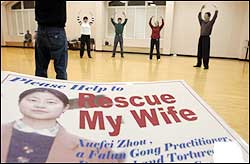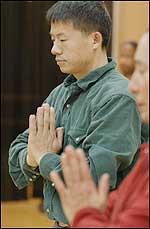Staff Writer
(Clearwisdom.net)

A poster seeking the release of Sam Lu's wife, Xuefei (Falling Snowflake), can be
seen at a Falun Gong class at Smyrna Community Center.

Sam Lu says of Xuefei: "When we were apart, we always worried something might
happen to the other."
Sam Lu misses his wife, Xuefei. He smiles when he talks about the woman whose name translates to "falling snowflake." Her husband said it described her gentle personality and purity.
Lu, who lives in Smyrna, hasn't talked to his wife since she was taken to a Chinese labor camp two years ago for handing out pamphlets on Falun Gong. He also was jailed for his adherence to the spiritual and meditative practice, but was released after two months.
The couple married a month after his release. Two months later, Xuefei was picked up on a street near their apartment in Shenzhen in southern China.
"When we were apart, we always worried something might happen to the other," Lu said. "Life was tough, but we had each other. Then I came home and she was gone."
Since then, Lu has embarked on a tireless, bittersweet mission to free his wife.
Lu, with the help of some local Falun Gong practitioners, has written dozens of letters seeking help from Georgia's elected officials. And when the Chinese president came to America, Lu followed -- hoping for an audience.
Until her release, Lu seeks solace in Falun Gong, the very thing that put his wife behind bars.
After Xuefei's arrest, her husband was allowed to leave China. He works as a warehouse manager for an auto parts company.
On Wednesday nights, he leads a Falun Gong class of 10 to 12 students at the Smyrna Community Center.
Lu has talked with Xuefei's mother, who occasionally visits her daughter. Because those conversations are monitored, he said his wife didn't know that he was working toward her release.
"My mother-in-law says for me to give up -- to find another woman," Lu said. "But I cannot. I love Xuefei for life. I love her always."
He carries a grim-faced picture of her with him almost everywhere he goes.
Her husband sees sorrow in her face and imagines a tear in the corner of her eye. The picture was taken while he was in prison.
He enlarged it on a small laminated poster with the words: "Please help to rescue my wife Xuefei Zhou, a Falun Gong practitioner detained and tortured in Chinese labor camp."
Lu started taking Falun Gong classes seven years ago while he was an exchange student studying accounting at Georgia State University. The practice, with a set regime of five contemplative exercises, was started by [Li Hongzhi] 10 years ago in his homeland. Its spiritual element and moral teachings make Falun Gong different from other meditative programs.
When he returned to China after a year in Georgia, Lu followed in his father's footsteps, working as a tax auditor for the government.
Three years ago he found a neighborhood Falun Gong class, where he met Xuefei, a 25-year-old advertising designer.
She was new to the class, and Lu, who was five years older, offered her advice. He said she learned quickly because she embodied the principles of Falun Gong--truthfulness, compassion and tolerance.
Lu said they fell in love and planned a life together. He had a good job, a large apartment and what he calls a simple and happy life.
That changed in late 1999, when the government labeled Falun Gong a cult and began arresting practitioners.
Lu said that the Chinese government was threatened by the spiritual aspect of Falun Gong and alarmed by its popularity.
Friends help him write letters and contact Georgia politicians to help with Xuefei's release. Ping Cai, who also took up Falun Gong as a college exchange student, is touched by Lu's devotion.
She was one of six people from Lu's class who traveled with him last month during Chinese President Jiang Zemin's visit to Mexico and the United States. The group held silent protests in each community the Chinese leader visited.
She remembers Lu standing in the rain on a roadside 10 miles from President Bush's ranch in Crawford, Texas. It was as close as the protesters were allowed to the meeting between the two leaders.
"He stood there for hours with his umbrella and poster of Xuefei," Cai said. "He didn't move. He didn't say a word."
Robert Calloway, another class member who went on the trip, began taking Tai Chi classes in 1972. He quit those after starting Falun Gong four years ago, citing revived health and a feeling of calmness from the exercises.
"We have to support them. No government should have the right to say a spiritual practice is bad or good," Calloway said. "They are against it because it is so good."
Cai calls the group's letter-writing campaign promising.
Before [Jiang]'s visit, she received a copy of a letter about the case that was sent to Bush and signed by 64 members of Congress.
Camille Osborne in Sen. Zell Miller's office said he sent inquiries about the case to the State Department, the U.S. Embassy in Beijing and the Foreign Relations Committed.
Osborne said they had several replies indicating their concerns were passed on to the Chinese government.
Lu is encouraged, but he longs for his old life.
He said he would not have been detained if he had lived only a few miles away from his apartment.
The city where he worked borders Hong Kong, where the rules are not as tight.
Although his parents have begged him to give up Falun Gong, Lu said he couldn't. He said his parents were heartbroken about their only son's exile and wanted him to come home.
"I just want to be with my wife and raise a family," Lu said. "I told her mother to tell her that I would wait for her my whole life. And I will."
http://www.accessatlanta.com/ajc/metro/cobb/1102/28falun.html
Category: Falun Dafa in the Media





